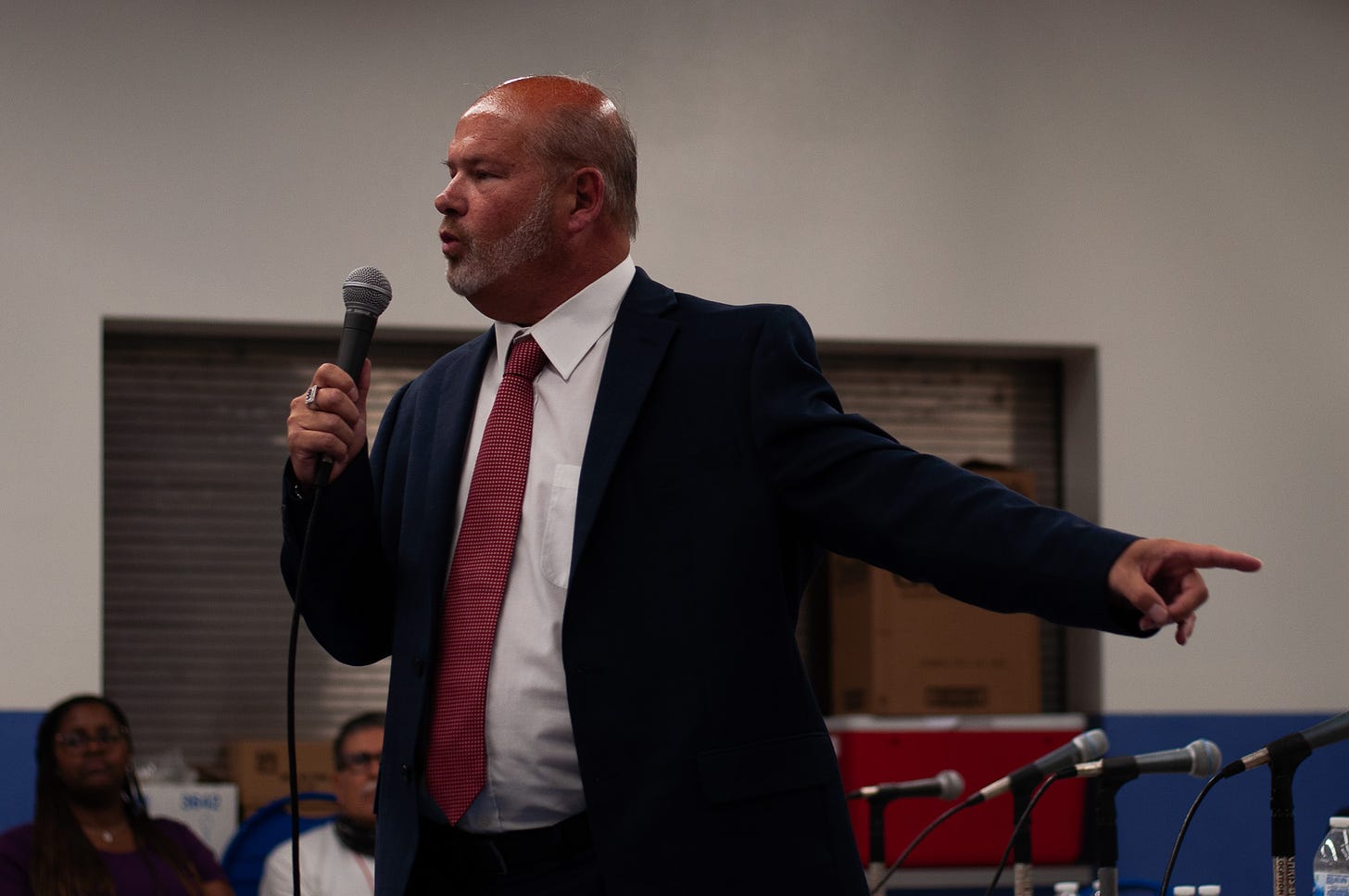The Daily Agenda: Terry Frederick eyes big changes at sheriff’s department
Terry Frederick is running as a "constitutional sheriff" … He wants to make changes with the border, staffing, and morale … Court ruling upends homeless rules.
Chris Nanos is facing four opponents in his quest for another term as Pima County Sheriff, but with the exception of one, all are political newcomers.
You might not remember Terry Frederick, but he explored a run for Sheriff back in 2012 and warned voters during speeches that if then-Sheriff Clarence Dupnik were reelected, he’d only serve two years before handing the reins to someone else to finish out the rest of his term.
Frederick was right. Dupnik beat Republican Mark Napier in the general election and in 2015, announced his retirement and encouraged Pima County supervisors to appoint his Chief Deputy Nanos as the next Sheriff.
A dozen years and a handful of department scandals later, Frederick is back in the race and hoping to beat Republicans Heather Lappin and Bill Phillips in the July 30 primary election.
Frederick is our last interview in the queue of sheriff candidates (we’ve reached out to Nanos, but haven’t received a response,) and with ballots hitting mailboxes any day now, voters will be deciding soon who will move onto November’s general election.

A former Pima County deputy who now owns a private investigation firm, Frederick said he’s focused on righting the department ship, increasing staffing and becoming an active player in the fight for border security. He shared some of this with voters at last month’s sheriff and county attorney candidate forum, calling himself a “constitutional sheriff.”
He told Caitlin that part of his desire to run stems from the national and worldwide trend of governmental overreach and giving state and federal bodies too much authority and “trying to trample on our constitutional rights.”
“There’s a big problem with what the federal government is doing and what the Pima County Sheriff’s Department is not doing right now,” Frederick said. “No one else is talking about how and who is going to protect our constitutional rights.”
If elected, Frederick will work to open a substation in Arivaca, saying that he’s seen drone videos of armed cartel base camps in the area and plans to stop the flow of fentanyl through the area.
“We can’t stop all the illegals coming in, but we can curb it,” he said “I want to do everything in my power to curb the illegals that are coming in. Texas is doing a good job and that’s why it’s coming our way.”
Frederick said he wants to be the first Pima County Sheriff to work proactively with tribal leaders from the Pascua Yaqui and Tohono O’odham nation to step up border enforcement. The plan is to help supply the tribes with technology they wouldn’t otherwise have access to while depending on them to assist the county with monitoring the 130 miles of land that borders Mexico.
He’ll start a rancher’s patrol unit to help proactively identify criminals crossing the border and also plans to start a border task force and has enlisted the help of other constitutional sheriffs to staff it, talking with departments as far east as Maryland.
But the impact of the border issues can also be felt right here in Tucson, Frederick said, adding that the “homeless population has boomed since Tucson became a sanctuary city and (President Joe) Biden took office.”
Our colleague Susan Barnett is looking into Frederick’s claims about the correlation between the homeless population and people crossing the border from Mexico, but it’s worth noting that Tucson is not technically a sanctuary city. While the city council designated Tucson as an “immigrant welcoming city in 2012,” voters overwhelmingly rejected such a measure back in 2019.
“I don’t have a problem with foreigners coming over and trying to live a better life and be a U.S. citizen, but there’s a proper way to do it,” Frederick said.
Another major topic in the sheriff’s race has been staffing and how to bring more employees into the department. Frederick said he’s been recruiting from the moment he decided to run, telling everyone who he thinks will be a good fit to call him if he wins the election.
“Some of my helpers have done the same. I’m working on trying to build up a list so that when we win the election, I can start calling these people,” he said.
But even if he’s able to increase staffing, Fredrick said the problem won’t be solved until the “toxic environment” in the department is no longer an issue, and that has to start at the top.
He plans to bring in a whole new command staff, eliminate some chief and captain positions and promote from within to help boost morale. And the new command staff won’t spend all their time sitting behind a desk, like the current one, Frederick said. They’ll spend six to eight hours each week working in the field, taking calls and patrolling the streets.
“This will increase faith in the command staff that they’re not just sitting behind a desk and not out of touch,” Frederick said, adding that improving department morale will go a long way towards increasing public safety. “A safer community is a thriving community and safety is my priority.”
Taking care of employees will also go a long way towards boosting morale, according to Frederick, who will use the savings from the eliminated chief and captain positions to give raises to other department employees. He said he also plans to put a psychologist on staff to help ensure that employees don’t have to bring the trauma associated with the job home to their families.
“Leadership is not about being in charge. It’s about taking care of those in your charge,” he said. “There’s a lot going on and the community needs someone who is going to stand up and do the right thing. That’s me.”
This story was supported by the Local News Initiative of Southern Arizona, a fund of the Community Foundation for Southern Arizona.
Home schooling: Sierra Vista middle and high school students will soon have the option to learn and complete their assignments without having to come to campus five days a week. Starting in the fall, Sierra Vista Unified School district is partnering with Arizona State University to offer a hybrid learning option for students in 7th through 12th grades. ASU’s Digital Prep program tailors coursework to align with students’ career interests in areas including technology, education, sustainability and journalism. Students in the program will come to campus twice a week to participate in activities and receive tutoring, if needed, and will still have full access to all extracurricular activities and sports. Students can also enroll in courses that give them the chance to earn college credit at no extra cost and with no risk to their GPA.
“Our aim with this partnership is to provide innovative new learning options for students and families who are seeking more flexibility during the school year,” said Dr. Eric Holmes, Superintendent of Sierra Vista Unified School District.
The weirding of LD17: Our sister newsletter the Arizona Agenda broke down the Republican primary race for the state Senate seat in Legislative District 17, where former state Sen. Vince Leach is calling incumbent Sen. Justine Wadsack “weird” and she is accusing him of using “Democratic talking points against me.” The latest fodder for the Leach campaign: Wadsack took home $60,000 in mileage reimbursement and per diem pay last year.
New legal framework for homeless: A U.S. Supreme Court decision on Friday opened the door for cities like Tucson to make it illegal for homeless people to sleep on the streets, Capitol Media Services’ Howard Fischer and the Arizona Daily Star’s Charles Borla report. Until Friday, a 9th Circuit Court of Appeals decision had blocked cities from enforcing anti-camping laws in Arizona and much of the West. The Tucson City Council cited that decision in February when they shied away from an ordinance that would have banned camping in washes.
Local fallout: The Supreme Court decision was a cause for concern for some advocates for the homeless in Tucson, Arizona Public Media’s Hannah Cree reports. They worried what will happen if the Tucson City Council follows through on the ordinance banning camping in washes.
“Now we're really concerned about how they're going to design this ordinance…this state cannot handle dealing with prohibiting any kind of encampments. Because, there just isn't enough housing, there isn't enough services,” said Xavi Martinez, who does homeless outreach with Tucson’s Community on Wheels.

Tragedy in the desert: Border Patrol agents found three migrants who died while crossing the desert west of Ajo on Wednesday, the Tucson Sentinel’s Paul Ingram reports. A group of migrants activated a rescue beacon, which the Border Patrol places in remote crossing corridors, and agents were able to rescue one of them. But an air crew found the body of a Mexican man and two other migrants later that day.
Red flags: The lack of internal controls at the Santa Cruz County Treasurer’s Office raised red flags with state auditors long before $4 million went missing from county accounts this year, the Nogales International’s Angela Gervasi reports. Those red flags were raised every year from 2004 to 2017, including four years when former Treasurer Liz Gutfahr was at the helm. Gutfahr resigned abruptly in April and the FBI seized nine vehicles from her residence as they investigate her role in the missing funds.
$7,682.15: The amount of cash on hand reported by Terry Frederick’s campaign as of March 31. The Tucson Sentinel’s Jim Nintzel previously reported that Frederick had to return his largest donation of $500, since accepting corporate contributions is illegal.









The cautionary tale of Liz Gutfahr adds further evidence that Arizona is still the scam-Capitol of the Southwest. Be ever vigilant.